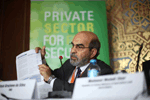High-level event on “Intensifying the efforts for global elimination of female genital mutilations” (co-organized by the Permanent Missions of Benin and Burkina Faso)
Monday, 24 September 2012, from 15:00 to 17:00 in Conference Room 5 (NLB).
[All members of permanent missions and permanent observer missions are
invited to attend. For further information, please contact the Permanent
Mission of Benin (e-mail beninewyork@gmail.com; tel. 1 (212) 684-1339);
or the Permanent Mission of Burkina Faso (e-mail
bfapm@un.int; tel. 1 (212) 308-4720).]
Panel discussion on “Alternative policy approaches to drug
control in Guatemala that seek to be more effective in protecting
security and human rights, as well as promoting social and economic
development” (with the President of the Republic of Guatemala) (organized by the Permanent Mission of Guatemala)
Tuesday, 25 September 2012, from 15:30 to 16:30 in Conference Room 7 (NLB).
[Members of permanent missions and permanent observer missions are
invited to attend. For registration and further information, please
contact Ms. Jennifer Pérez, Permanent Mission of Guatemala (e-mail
eventos@guatemalaun.org; tel. 1 (212) 679-4760, ext. 242).]
Parliamentary meeting on “Parliaments and the rule of law: Toward justice for all” (co-organized
by the Inter-Parliamentary Union (IPU) and the International
Development Law Organization (IDLO), with the sponsorship of the
Permanent Mission of Italy)
Wednesday, 26 September 2012, from 15:00 to 18:00 in Conference Room 3 (NLB).
[Open to members of parliament attending the opening of the General
Assembly, as well as representatives of permanent missions, observer
offices and civil society organizations duly accredited to the United
Nations. For further information, please visit
www.ipu.org/splz-e/unbrief12.htm; or contact Ms. Karin Riedl, IPU
(e-mail
ny-office@ipu.org); or Ms. Judit Arenas, IDLO (e-mail
jarenas@idlo.int).]
High-level event on “Multilateral partnership in MDG’s
acceleration: Experience from implementation of Nigeria’s MDGs
Conditional Grant Scheme at the subnational Level” (co-organized by the Permanent Mission of Nigeria and the United Nations Millennium Campaign)
Thursday, 27 September 2012, from 10:00 to 13:00, at the Millennium United Nations Plaza Hotel.
[Members of permanent and permanent observer missions are invited to
attend. For further information, please contact the Permanent Mission of
Nigeria (e-mail
saniedem@yahoo.co.uk; tel. 1 (646) 267-9200).]
Sixth Ministerial Meeting in support of the Comprehensive Nuclear-Test-Ban Treaty (CTBT)
(co-organized by the Friends of the CTBT (Australia, Canada, Finland,
Japan and the Netherlands) and the Co-Chairs of the Article XIV
Conference of the CTBT (Mexico and Sweden))
Thursday, 27 September 2012, from 10:00 to 10:45 in Conference Room 4 (NLB).
[All members of permanent missions that are signatories to the CTBT are
invited to attend. For further information, please contact Ms. Claire
Elias, Permanent Mission of Australia (e-mail
claire.elias@dfat.gov.au; tel. 1 (212) 351-6622).]
High-level launch of the United Nations Guidance for Effective Mediation
(co-organized by the Executive Office of the Secretary General and the
Permanent Missions of Finland and Turkey, on behalf of the Group of
Friends of Mediation)
Thursday, 27 September 2012, from 11:00 to 13:00, at the Permanent Mission of Turkey (821 United Nations Plaza, 8th Floor).
[Members of permanent missions and permanent observer missions are
invited to attend. For registration and further information, please
contact Ms. Tuba Yanilmaz, Permanent Mission of Turkey (e-mail
tuba.yanilmaz@mfa.gov.tr; tel. 1 (212) 450-9114).]
Parliamentary meeting on “Parliaments and the rule of law: Toward justice for all”
(co-organized by the Inter-Parliamentary Union (IPU) and the
International Development Law Organization (IDLO), with the sponsorship
of the Permanent Mission of Italy)
Wednesday, 26 September 2012, from 15:00 to 18:00 in Conference Room 3 (NLB).
[Open to members of parliament attending the opening of the General
Assembly, as well as representatives of permanent missions, observer
offices and civil society organizations duly accredited to the United
Nations. For further information, please visit
www.ipu.org/splz-e/unbrief12.htm; or contact Ms. Karin Riedl, IPU
(e-mail
ny-office@ipu.org); or Ms. Judit Arenas, IDLO (e-mail
jarenas@idlo.int).]
High-level event on “Multilateral partnership in MDG’s
acceleration: Experience from implementation of Nigeria’s MDGs
Conditional Grant Scheme at the subnational Level” (co-organized by the Permanent Mission of Nigeria and the United Nations Millennium Campaign)
Thursday, 27 September 2012, from 10:00 to 13:00, at the Millennium United Nations Plaza Hotel.
[Members of permanent and permanent observer missions are invited to
attend. For further information, please contact the Permanent Mission of
Nigeria (e-mail
saniedem@yahoo.co.uk; tel. 1 (646) 267-9200).]
Sixth Ministerial Meeting in support of the Comprehensive Nuclear-Test-Ban Treaty (CTBT)
(co-organized by the Friends of the CTBT (Australia, Canada, Finland,
Japan and the Netherlands) and the Co-Chairs of the Article XIV
Conference of the CTBT (Mexico and Sweden))
Thursday, 27 September 2012, from 10:00 to 10:45 in Conference Room 4 (NLB).
[All members of permanent missions that are signatories to the CTBT are
invited to attend. For further information, please contact Ms. Claire
Elias, Permanent Mission of Australia (e-mail claire.elias@dfat.gov.au;
tel. 1 (212) 351-6622).]
High-level launch of the United Nations Guidance for Effective Mediation
(co-organized by the Executive Office of the Secretary General and the
Permanent Missions of Finland and Turkey, on behalf of the Group of
Friends of Mediation)
Thursday, 27 September 2012, from 11:00 to 13:00, at the Permanent Mission of Turkey (821 United Nations Plaza, 8th Floor).
[Members of permanent missions and permanent observer missions are
invited to attend. For registration and further information, please
contact Ms. Tuba Yanilmaz, Permanent Mission of Turkey (e-mail
tuba.yanilmaz@mfa.gov.tr; tel. 1 (212) 450-9114).]



























































